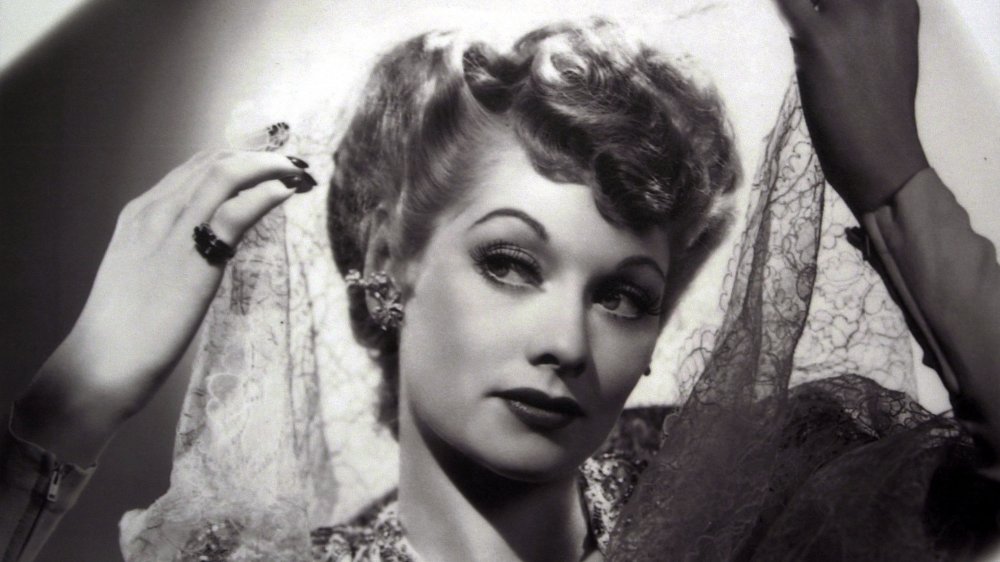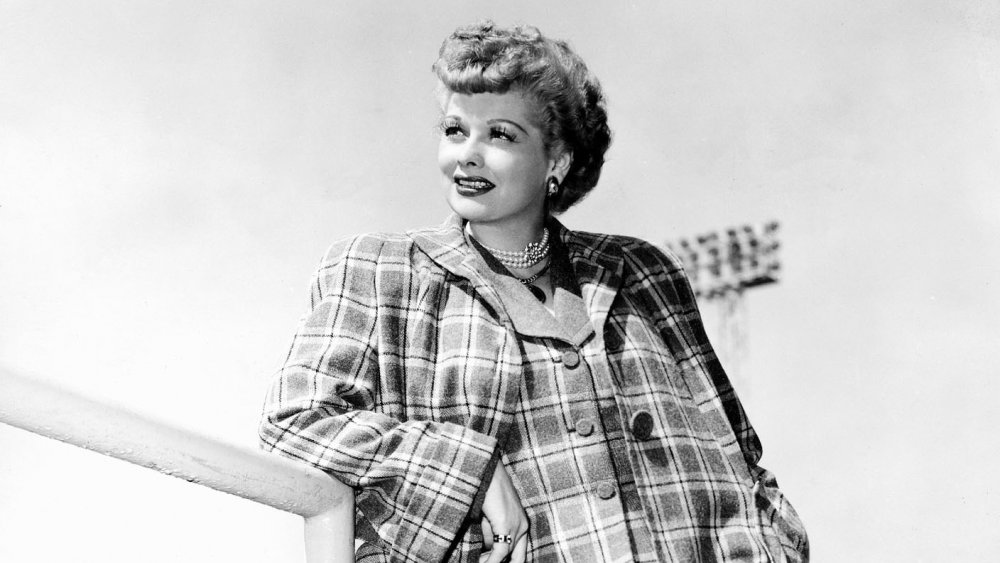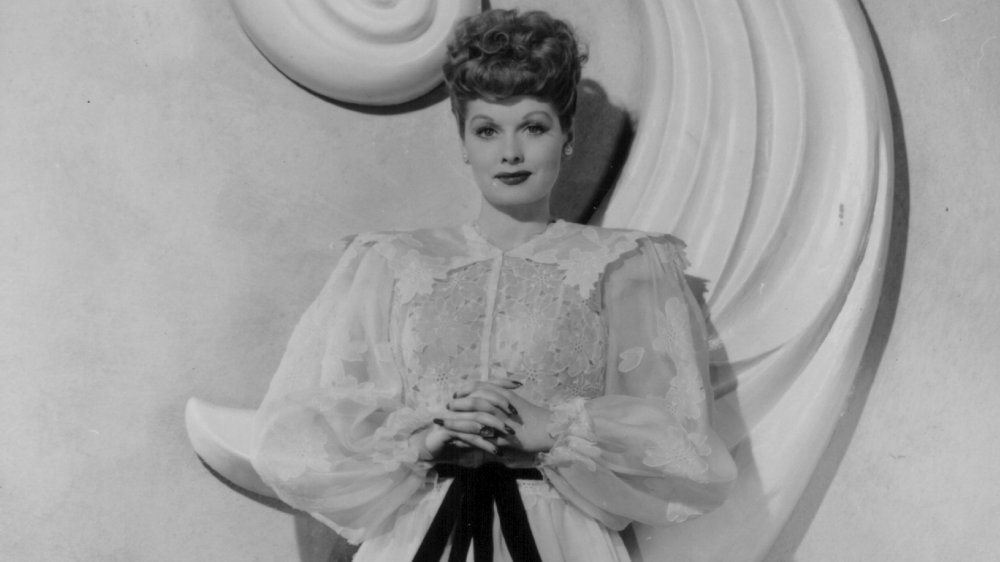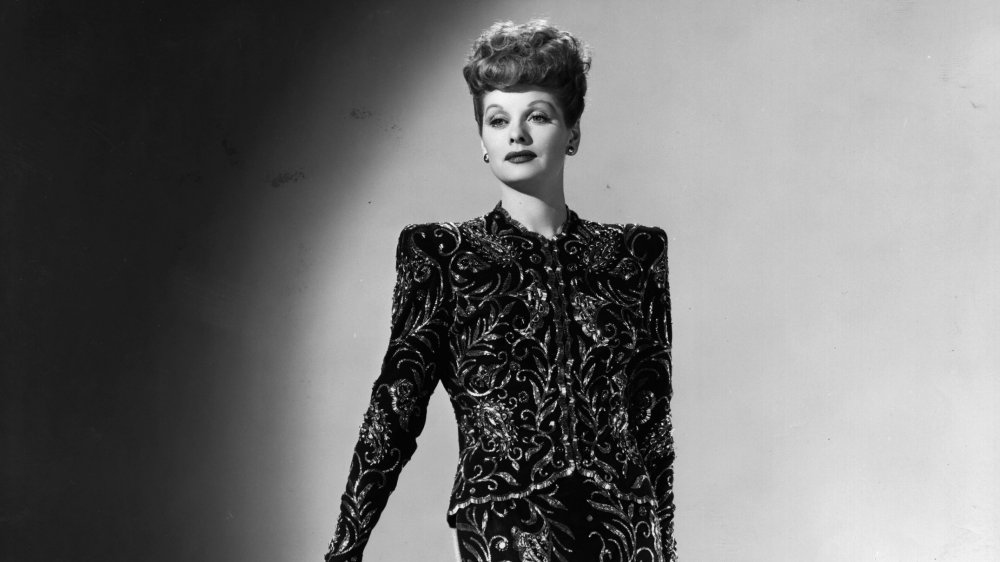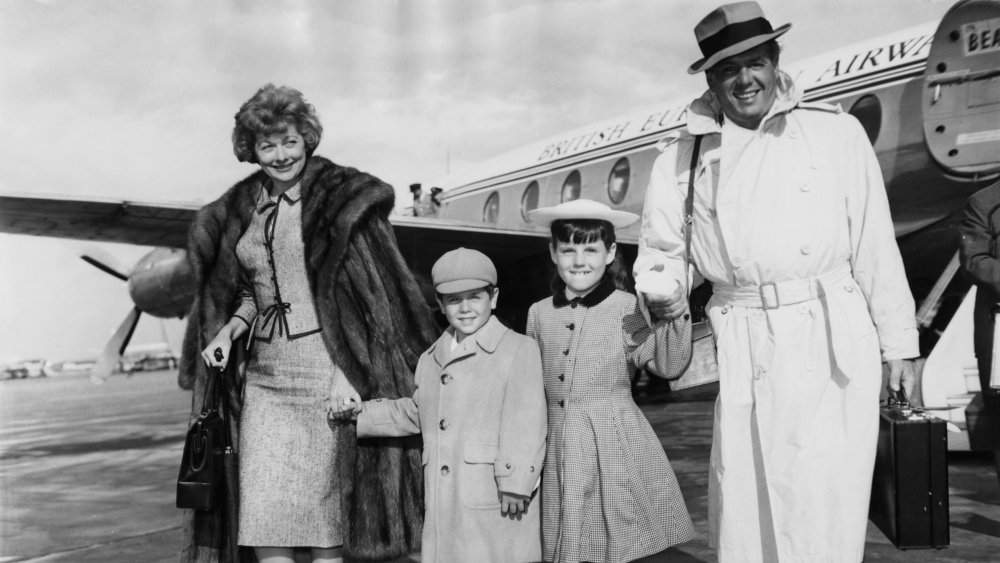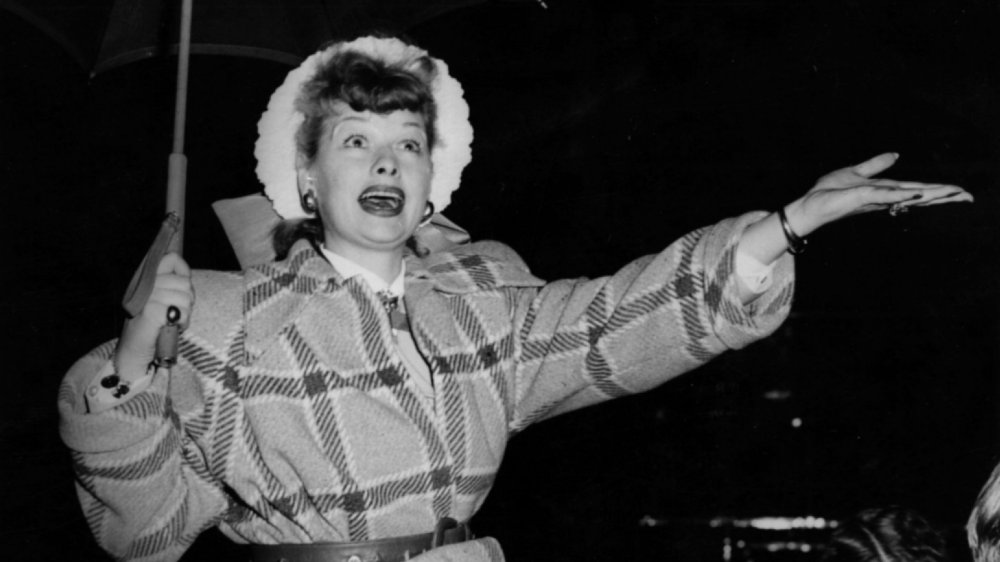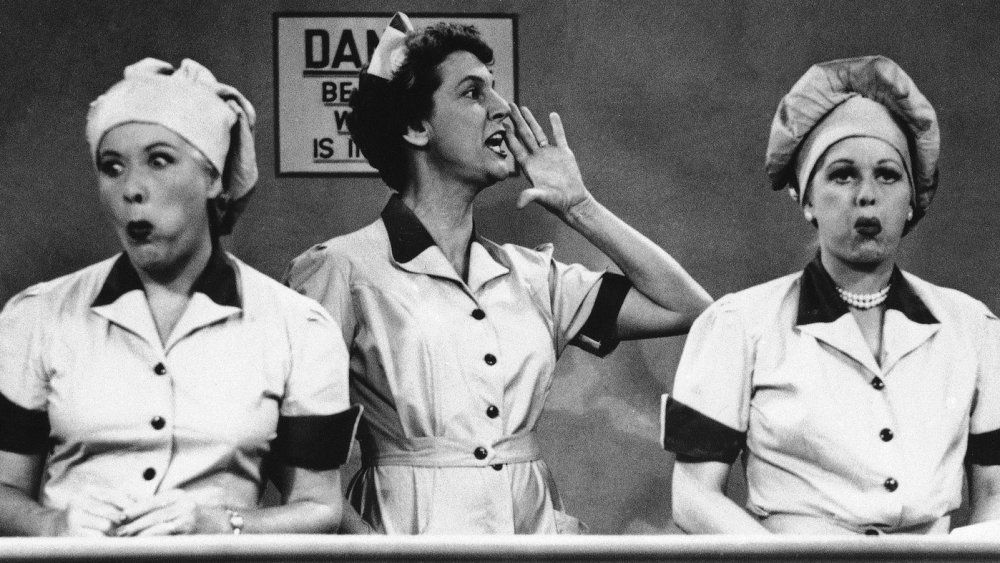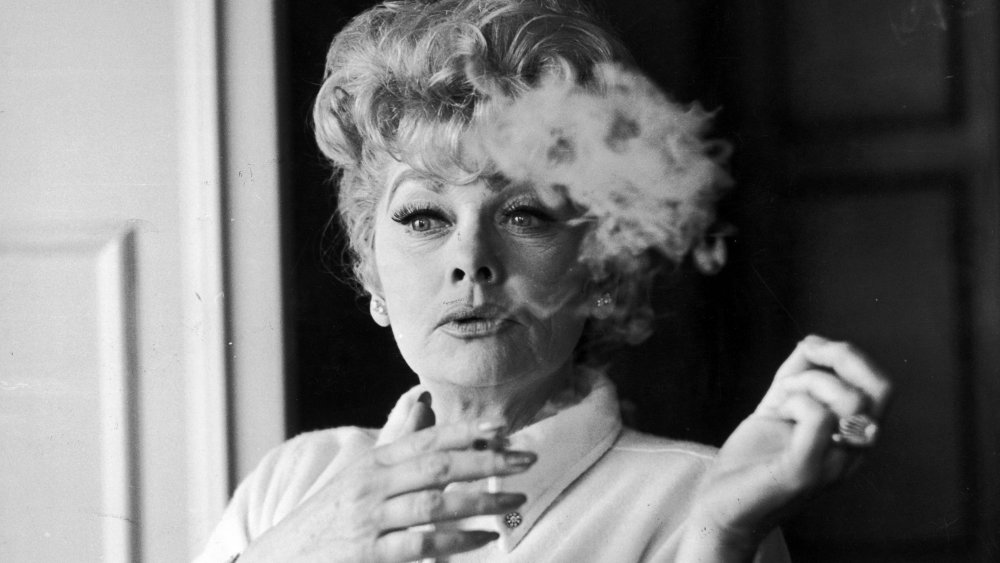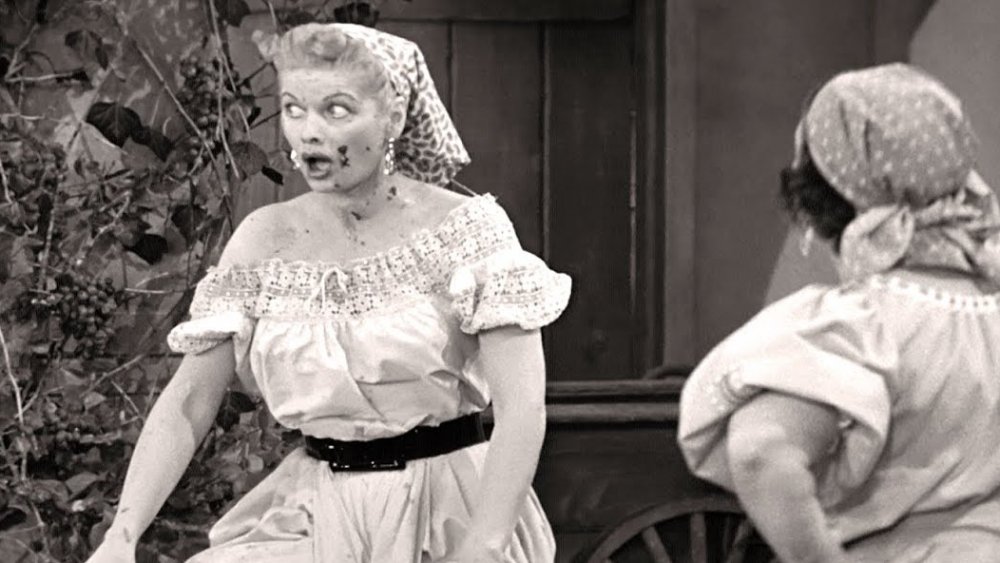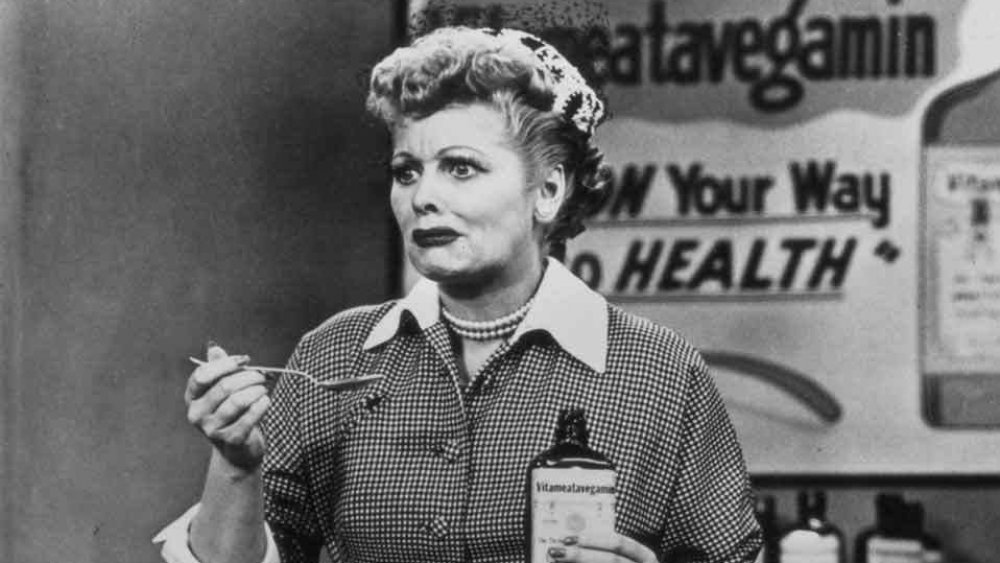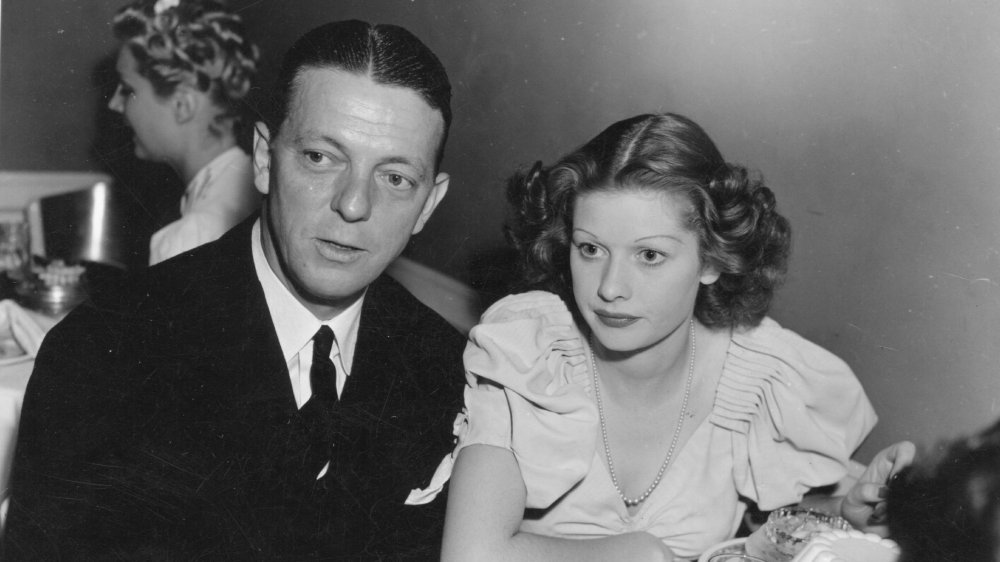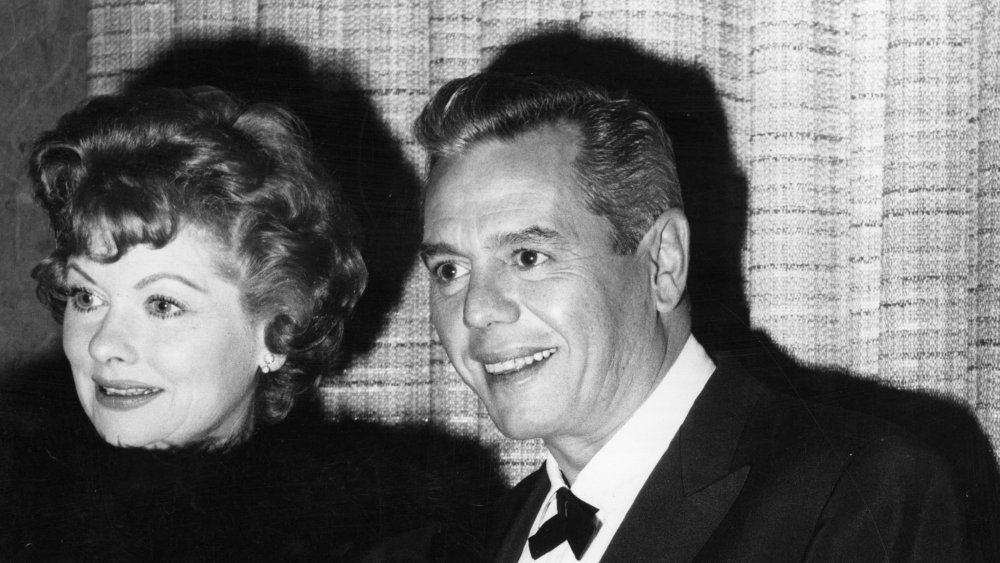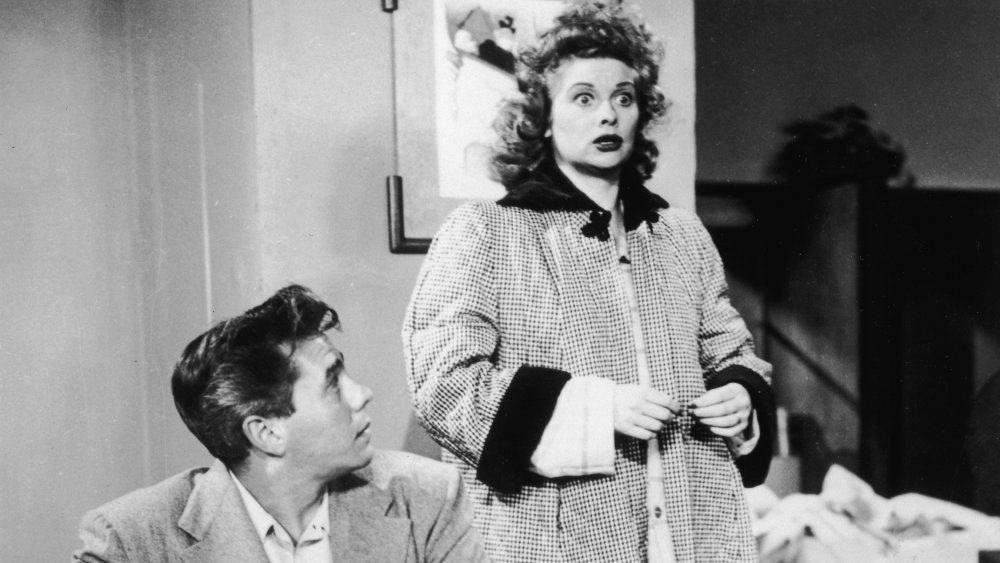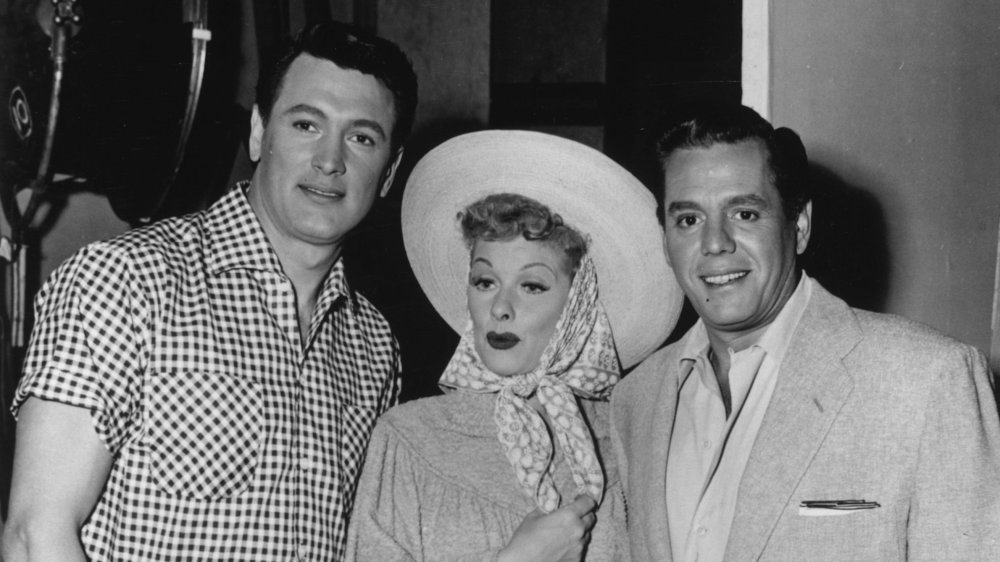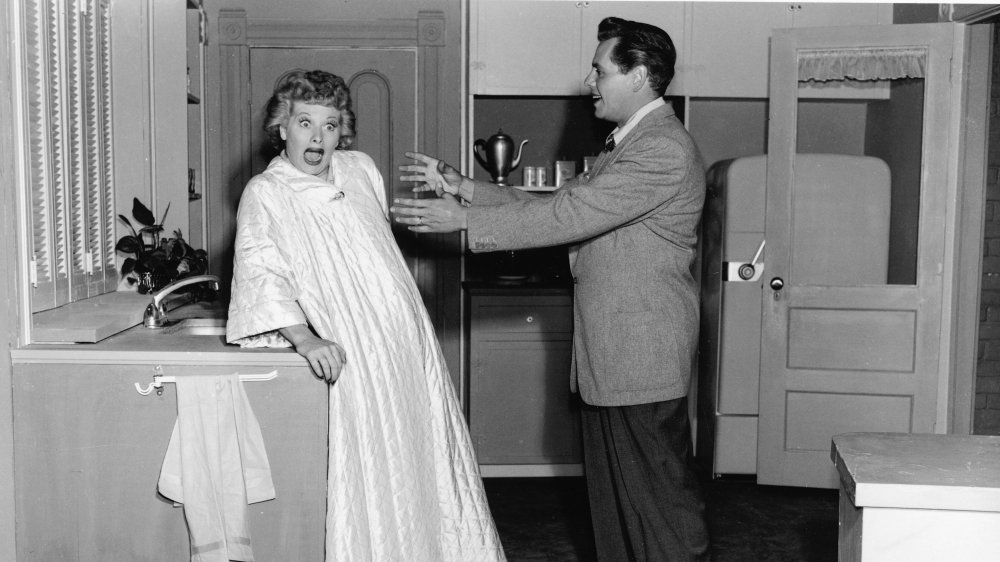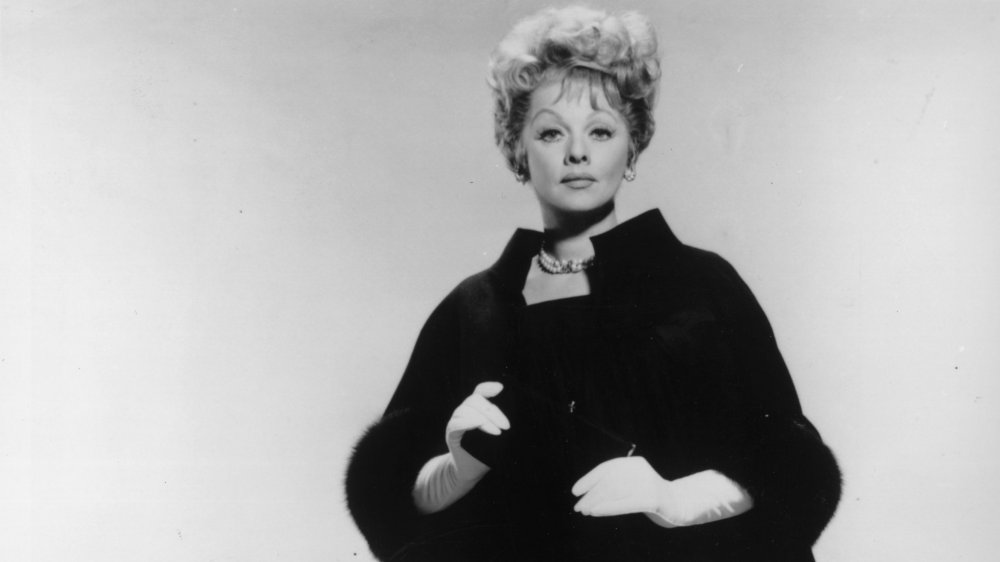The Untold Truth Of Lucille Ball
Lucille Ball had an impact on the world of television that few others will ever be able to match. The actress and comedian was a trailblazer in a myriad of ways, whether it was daring to be a woman in comedy, being one of the first women to act while visibly pregnant on television, or normalizing an interracial marriage in front of the entire world. Indeed, Ball projected an aura of fearlessness, which is the enduring legacy of one of Hollywood's most beloved stars of all time.
But, believe it or not, there's more to Ball than her incredible career accomplishments as she was also a human being just like anyone else. She had her ups and downs throughout life, which included bringing children into the world, marrying and later divorcing Desi Arnaz, and remarrying before passing away from heart issues in 1989.
So, what else is there to know about the pioneering and intrepid Lucille Ball? What was she like in real life; what made her tick? Read on to discover her untold truth.
Lucille Ball didn't have a very happy childhood
Although Lucille Ball was known for her deft comedic abilities, she didn't come from an especially humorous or even happy family. After losing her father when she was only four years old, Ball's mother remarried and the preschooler went to live with her stepfather's grandparents.
As Ball tells it, they were strict and had "old-country ideas." She continued, telling The Saturday Evening Post, "They treated other children the way I wanted to be treated, but not me. They did that to discipline me, but for me it was the wrong way to bring up a child."
Perhaps unwittingly, however, that method of arguably incorrect parenting led Ball to discover the power of humor. "It gave me a feeling of frustration and of reaching-out-and-trying-to-please," she explained. "I found the quickest and easiest way to do that was to make people laugh." Fortunately the principal of Ball's school saw that urge in her and ensured that she was cast in school musicals and plays. Her stepparents also encouraged her to pursue the arts.
Lucille Ball's life changed when she was 16
On July 4, 1927, Lucille Ball's life would change irrevocably in an instant. On that day, Ball's grandfather was teaching her brother how to use the gun he'd just purchased for him, after meticulously setting up a tin can target in the backyard. "It was a birthday present for [Ball's brother] Freddy, who was about to turn 12 — a real .22-caliber rifle," Ball wrote in her memoir (via HuffPost).
Sadly, when a friend of her brother's was aiming at the target, Ball's eight-year-old neighbor accidentally wound up in the path of a bullet. And while he didn't die, the bullet severed his spinal cord, paralyzing him for life.
The boy's family later sued Ball's grandfather for everything he was worth. "They took our house, the furnishings that [Ball's mother] DeDe had bought so laboriously on time, week after week, the insurance — everything," she continued. "My grandfather never worked again." She added that it took the heart out of him.
At the beginning of her career, Lucille Ball was a starving actress
Lucille Ball may have been Hollywood royalty thanks to her brilliant mind and incredible comedic chops, but she certainly wasn't born into it. In fact, when she first moved out to Los Angeles, California to pursue her artistic dreams, Ball was completely broke. "I literally starved," she revealed in an interview with famed celebrity interviewers David Fantle and Tom Johnson (via Fox News). "I was young, very backward and awkward. Vaudeville was the only thing I knew so I tried to break in."
Unfortunately, by the time Ball arrived in Hollywood, Vaudeville had already come and gone, which forced her to explore other avenues. "The lack of food and work forced me into modeling," she continued. "I finally became a showgirl and my first job in Hollywood was as a showgirl." And while Ball had only planned to stay in Southern California for six weeks, she never ended up leaving as that's where her destiny awaited her.
Lucille Ball was open about pregnancy loss
One of the things Lucille Ball is known for is appearing on television while visibly pregnant. And, in fact, she was one of the first women ever to do so. At the time it was taboo to the point that she and Desi Arnaz had to get permission from the network to acknowledge the pregnancy on-screen. They also needed a priest, minister, and rabbi — which sounds like the makings of a bad joke — to sign off on each episode.
What's lesser known about Ball is that she was also candid about having a miscarriage, which occurred just after she and Arnaz dreamed up I Love Lucy. In fact, one of the reasons they took their proto show to Vaudeville was to help her cope with the loss of that child.
Ball wasn't shy about discussing her birth experiences either. "Our first child, Lucy, had been born by Cesarean section," she revealed to The Saturday Evening Post. "Little Desi was delivered by Cesarean too. If you know your baby is going to be a Cesarean baby, it helps you call your shots."
In real life, Lucille Ball was quite serious
If you've ever watched I Love Lucy, you're likely to think that Lucille Ball was just as much of a cut-up off-stage as she was on. But according to Pamela Mason Wagner, the director of the bio-documentary Finding Lucy, Ball wasn't like her onscreen counterpart in real life. "She's full of contradictions, which is always fodder for a good story," she shared in an interview with American Masters. "She was a funny actress who couldn't tell a joke, and was quite serious in real life." Who would have thought?
In addition to being a solemn person, Wagner says that Ball didn't necessarily want the clout that she had in Tinsel Town. "She became one of the most successful business women in Hollywood, yet she was never comfortable with her own power," she added. This was despite the fact that Ball and her husband Desi Arnaz had basically invented the sitcom, too.
Was Vivian Vance really Lucille Ball's rival?
While Lucille Ball and Desi Arnaz were the main stars of I Love Lucy, Vivian Vance, who played Ethel Mertz, and William Frawley, who played Fred Mertz, were also fixtures in the pioneering comedy. But as rumor has it, Ball and Vance had quite the rivalry on set, and allegedly couldn't stand one another.
However, there's more to the story, according to celebrity interviewer Tom Johnson. He revealed that Ball actually adored Vance. "She said the only person she would really watch when she ever looked at her own TV shows was Vivian Vance," he said in a chat with Fox News. "She always watched her." He added that Ball loved working with her fellow actress and said Vance was one of the few people who could give Ball "a real belly laugh."
Johnson also noted that the real antagonism on set was between Vance and Frawley who, as Fox News put it, were "at each other all the time."
Lucille Ball wasn't interested in drugs
If you've never caught an episode of I Love Lucy, you may be shocked at how much smoking happens on the show. In fact, Lucille Ball and Desi Arnaz even did commercials promoting cigarettes for Phillip Morris, as they sponsored I Love Lucy for a few years, according to PopMatters. Ball was a smoker in real life, too.
However, that's the only substance Ball indulged in, as getting drunk or high just didn't appeal to her. "The first time I was around marijuana I wondered why someone was passing me this cigarette he had just smoked," she explained to People magazine. "I've never tried it." And when she drank alcohol, Ball said she either got sick or fell asleep.
Ball wasn't a fan of the heavy hitters, either, as she didn't like the way they made her feel. "I'm allergic to morphine, Percodan [aspirin and oxycodone], codeine," she continued. "I can't take any of those things because they work in reverse. The eyes won't close."
Lucille Ball didn't improvise on I Love Lucy
When it comes to classic moments from I Love Lucy, aficionados of the show will rattle off their favorite scenes: Ethel and Lucy working on the chocolate assembly line, Lucy grape-stomping, and Lucy meeting Harpo Marx, to name just a few. Certainly some of the comedy gold from these moments was improvisational magic, right?
Actually, wrong, according to celebrity interviewer David Fantle — and Lucille Ball was adamant about telling this truth. "She wanted people to know that there was no ad-libbing,'" he explained to Fox News. "She said, 'We knew our characters inside and out. There was no ad-libbing. We came in, read the script and did our jobs.'"
Ball also wanted to set the record straight regarding the goofy, physical comedy that the series was known for. "She wanted people to know despite what they thought, the slapstick and the zaniness was just a tiny part of the series," Fantle added. Ball insisted, instead, that credit should be given to the talented writers.
Lucille Ball performed this classic bit in just one take
Of the many iconic episodes of I Love Lucy, one in particular contains the now well-known skit wherein Lucille Ball winds up promoting a health tonic called Vitameatavegamin. This scene was written just as it was performed, according to show writers Madelyn Pugh Davis and Bob Carroll Jr. "The TV commercial was scripted," they shared in an interview with the Television Academy Foundation. "It took us a day and a half to get that name Vitameatavegamin, too. That was a tough one." It still is!
What's especially incredible about that scene is that Ball didn't need a ton of support nor a lot of time to nail it. "The most amazing thing is that she didn't use any cue cards," they continued. "She did that whole thing in one take. Which she did a lot." That's a real testament to the star's comedic and acting prowess.
There would be no Star Trek without Lucille Ball
After Lucille Ball and Desi Arnaz put I Love Lucy to rest in 1957, they found themselves quite well off financially. So, what did they do with all of that money? According to Entertainment Weekly, the couple decided to purchase the former RKO Studios. They renamed it Desilu Productions and quickly saw success as one of the biggest independent production companies in SoCal.
That series of events led to Ball becoming one of the most powerful women in Hollywood, which turned out to be a lifesaver for the now-iconic science-fiction series Star Trek. After being scouted by Desilu, series creator Gene Roddenberry managed to score a pilot order from NBC, though the board of directors at Desilu were not fans. Fortunately for Roddenberry, Ball overruled them and saw to it that the expensive pilot was made.
Still, NBC rejected the pilot. Unwilling to see Star Trek relegated to the cutting room floor, Ball had a second pilot made, partially financed with her own money. This time, NBC picked it up. As former studio exec Ed Holly revealed Desilu historian Coyne Steven Sanders (via Entertainment Weekly) surmised, "If it were not for Lucy, there would be no Star Trek today."
Lucille Ball says that Desi Arnaz frightened her
Easily one of the most iconic couples in Hollywood history, Lucille Ball and Desi Arnaz were groundbreaking in that they normalized interracial marriage on television; Ball was Caucasian, and Arnaz was Cuban-American. But that never fazed Ball, who says sparks flew fairly quickly between them. "I met [Desi Arnaz] at the RKO studio in May 1940," she recalled in an interview with The Saturday Evening Post. "He asked me for a date that very night," she added, "and pretty soon we were married."
That was in spite of Arnaz's more wild nature, specifically how he operated a motor vehicle. The first time Ball got in a car with him, she thought he was a maniac because of how fast he drove. "He frightened me," she continued. "Marrying Desi was the boldest thing I ever did."
The marriage of Desi Arnaz and Lucille Ball lasted 20 years, according to History, with its dissolution mostly due to his proclivity for alcohol and extra-marital affairs.
After their divorce, Lucille Ball and Desi Arnaz got along
Even though Desi Arnaz wasn't exactly the best husband in the world, after his marriage to Lucille Ball came to an end, his ex-wife said they still got along. "Always have," she told People magazine. "We didn't even get two lawyers for the divorce." Ball added that they continued to see each other on social occasions, and that his second wife was a "very nice girl."
Like Arnaz, Ball also remarried. In 1961, she wed comedian Gary Morton, who she described as a naturally moderate person. "He doesn't think the grass is greener elsewhere, he's not a workaholic or a playaholic and he appreciates his home," she told the publication. "Desi was a very generous man who built many houses but never lived in any home."
Ball and Morton were married for 28 years until the actress passed away in 1989, according to the Independent. Morton died ten years later.
Lucille Ball had progressive views for her time
While Lucille Ball was definitely the product of a more conservative era, she had some pretty progressive views, as is evidenced by her marriage to Desi Arnaz in 1940. But Ball was also forward-thinking when it came to women's liberation, though she personally wasn't active in the movement herself. "They can use my name for equal rights, but I don't get out there and raise hell because I've been so liberated I have nothing to squawk about," she explained in an interview with People. Well, that may be because she steamrolled over any barrier that popped up in front of her, but fair enough.
Ball was also progressive when it came to gay rights and wasn't fazed in the least by people's dating preferences. "It's perfectly all right with me," she proclaimed during the 1980 interview. "Some of the most gifted people I've ever met or read about are homosexual. How can you knock it?"
Lucille Ball was once accused of being a communist
In the late 1940s through the early 1950s, America was held hostage by the perceived threat of communism, which had politicians on the hunt for offenders. Hollywood was not immune to the reach of it, either, according to Dann Cahn, the editor of I Love Lucy. "In those early seasons of I Love Lucy, we had the terrible Red Scare," he recalled in an interview with the Television Academy Foundation. "They called Lucy a Communist and everybody was walking around in Hollywood afraid that we'd be called up before the House Un-American Activities Committee." Um, yikes!
After being investigated by government, the allegations against Lucille Ball turned out to be false as she was not involved with the communist party at all. "Her grandpa had been a Socialist, and somehow she had signed a card to the Communist Party for the old man to keep him quiet," Cahn continued. Things quieted down after those revelations went public.
Lucille Ball is a descendant of those accused of witchcraft in Salem
In the late seventeenth century, the notorious Salem Witch Trials were conducted in Salem, Massachusetts. It was the most deadly hunt for so-called witches on American soil in history, with a body count of 19 women and men, as well as two dogs, according to NPR. Another 144 to 185 people were accused of witchcraft, including everyone from a five-year-old girl to octogenarians. Frankly, the search for alleged communists nearly three centuries later bore resemblance to those trials, something very much on the radar of The Crucible playwright Arthur Miller.
So, what does all of this history have to do with Lucille Ball? Well, as it turns out, Ball and several "celebrated Americans ...were descended from the accused witches," according to NPR. Other celebs include both Clara Barton and Walt Disney, which makes you wonder who else was lost to the hysteria of those paranoid proceedings.
